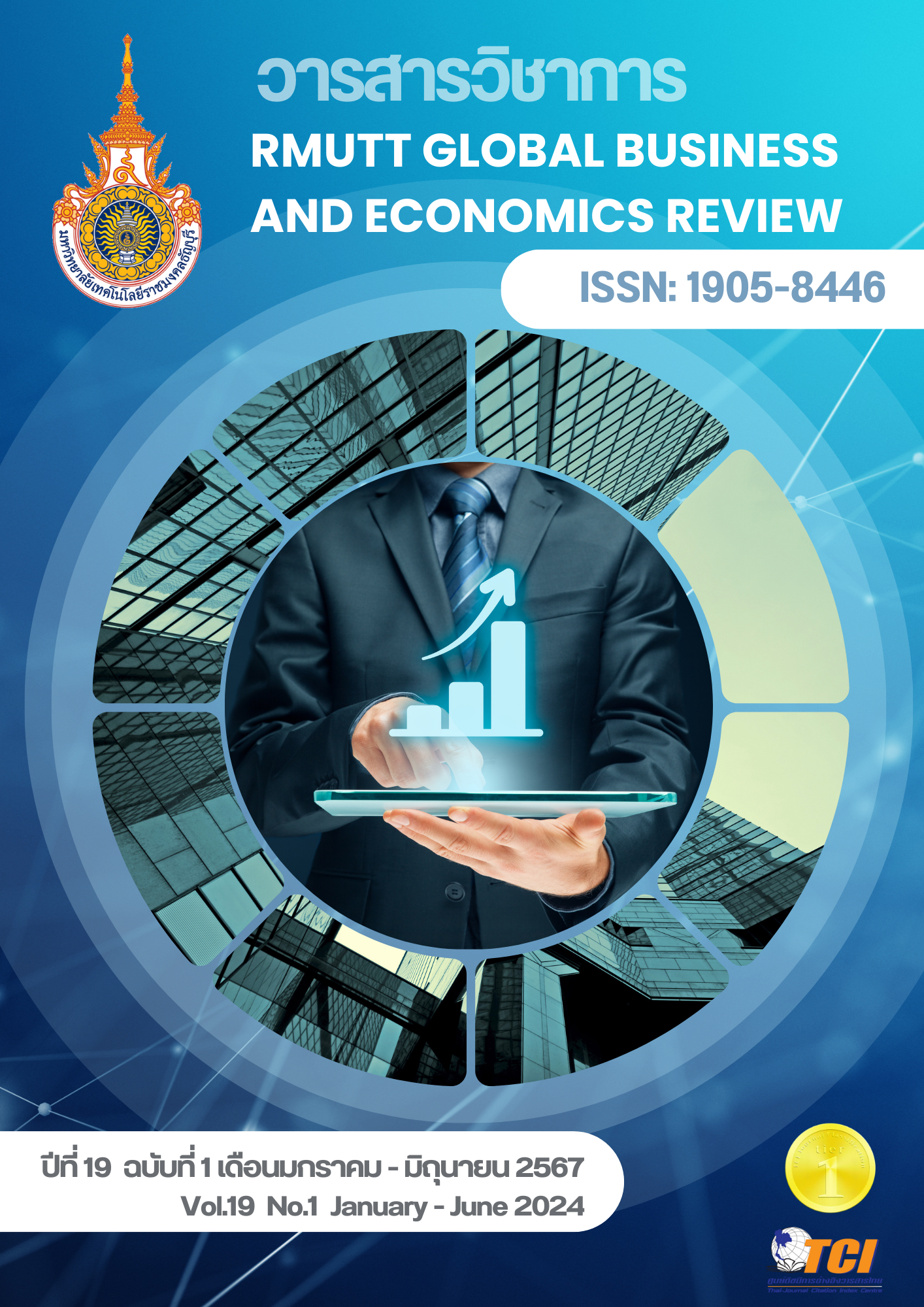The DEVELOPMENT OF HOUSEHOLD ACCOUNTING MODEL TO ENHANCE SELF-SUFFICIENCY LIVING IN BANG MUANG SUB-DISTRICT MUNICIPALITY, BANGYAI DISTRICT, NONTHABURI PROVINCE
DOI:
https://doi.org/10.60101/rmuttgber.2024.277165Keywords:
Household Accounting, Livelihood Values, Model Development, Self-SufficiencyAbstract
This research aims to: 1) investigate the current situation regarding knowledge, methods, and obstacles in household accounting practices. 2) Develop and enhance household accounting models to improve sustainable living standards. 3)Test the effectiveness of the developed models through mixed-method research involving important data providers for Objectives 1 and 3, consisting of a community committee of 27 members and significant contributors to model development within the jurisdiction of Bang Muang Municipality, totaling 15 individuals. We tailored the selection criteria to the qualifications in data provision. Research tools included five types: interviews, tests, model format manuals, questionnaires, and data analysis utilizing quantitative research methods employing statistical analysis such as percentages, means, standard deviations, and paired sample t-tests. Qualitative research involved content analysis and narrative description. Research findings revealed that: 1) Currently, the sampled group possesses limited knowledge and understanding of household accounting and its relationship with the sufficiency economy philosophy, with only one household employing a simplified, self-understood method for accounting. Reasons for a lack of accounting include insufficient knowledge and understanding, a lack of motivation, and inadequate promotion and support from organizations. 2) The developed model comprises 7 steps and 28 activities. 3) Post-experiment testing results showed statistically significant increases in average knowledge scores compared to pre-experiment levels at the.05 significance level, alongside the highest satisfaction with the model. This led to improved financial health, community participation, and environmental conservation. Therefore, the developed model will benefit the community in terms of resilience-building and enhancing sustainable living values in line with sufficiency economy principles.
References
กัมพล เพ็ชรล้อมทอง, สุรภา เอมสกุล และธนัสถา โรจนตระกูล. (2564). กระบวนการสร้างชุมชนเข็มแข็งอย่างยั่งยืนแบบพึ่งพาตน. วารสารJournal of Roi Kaensarn Academi, 6(12), 354-368.
ธนวรรธน์ พลวิชัย. (2566). หนี้ครัวเรือนไทยพุ่ง 5.59 แสนต่อครอบครัว สูงสุดรอบ 15ปี. https://www.prachachat.net/economy/news-1357509
ธีร์วรา สุตัณฑวิบูลย์, นัยนา แคล้วเครือ, พรสิริ สุขผ่อง, ยุพา สะรุโณ และลำใย มีเสน่ห์. (2562). การศึกษาพฤติกรรมและสภาพปัญหาการจัดทำบัญชีครัวเรือนตามปรัชญาเศรษฐกิจพอเพียงเพื่อลดปัญหาหนี้สินของเกษตรกรจังหวัดราชบุรี. (2562). วารสารบัญชีปริทัศน์มหาวิทยาลัยราชภัฏเชียงราย, 4(2), 58-71.
บุปผา คำนวณ. (2563). รูปแบบการจัดทำบัญชีครัวเรือนของกลุ่มชาติพันธุ์ไทใหญ่ในอำเภอเมือง จังหวัดแม่ฮ่องสอน. วารสารวิทยาลัยสงฆ์นครลำปาง, 9(3), 28-40.
ผกามาศ บุตรสาลี, สุพัตรา รักการศิลป์ และแก้วมณี อุทิรัมย์. (2565). นวัตกรรมการจัดการความรู้ด้านการจัดทำบัญชีครัวเรือนตามปรัชญาเศรษฐกิจพอเพียงเพื่อการเสริมสร้างองค์ความรู้อย่างยั่งยืนของชุมชนสายยาว ตำบลถลุงเหล็ก อำเภอเมือง จังหวัดบุรีรัมย์.วารสารชุมชนวิจัย, 16(1), 92-103.
วิไลภรณ์ คำมั่น, ฟารีดา หีมอะด้ำ และกฤธยากาญจน์ โตพิทักษ. (2564). การประเมินแบบเสริมพลัง: การประยุกต์ใช้เพื่อเพิ่มประสิทธิภาพ การประเมินผลการเรียนรู้สู่ความเป็นครูมืออาชีพในศตวรรษที่ 21. วารสารมนุษยศาสตร์และสังคมศาสตร์มหาวิทยาลัยมหาสารคาม, 40(6), 54-67.
ศูนย์วิเคราะห์เศรษฐกิจ ทีทีบี. (2567).ประเมินสัดส่วนหนี้ครัวเรือนไทยสิ้นปี 2567 อาจเพิ่มขึ้นแตะระดับ 91.4% ต่อจีดีพี. https://www.ttbbank.com/th/newsroom/detail/ttba-thai-household-debt-end-2024.
สัญญา ยือราน และศิวิไลซ์ วนรัตน์วิจิตร. (2561). การวิจัยเชิงปฏิบัติการแบบมีส่วนร่วม สู่ความสำเร็จการเปลี่ยนแปลงนโยบายในระบบสุขภาพ. วารสารเครือข่ายวิทยาลัยพยาบาลและการสาธารณสุขภาคใต้, 5(2), 288-300.
สรัญญา จันทร์สว่าง. (2558). จับตา‘ปัญหาสังคม’คู่ขนาน การเติบโตของเมือง-เศรษฐกิจ. https://www.bangkokbiznews.com/blogs/columnist
สุนีย์รัตน์ วุฒิจินดานนท์. (2560). การศึกษากระบวนการเรียนรู้การจัดทำบัญชีครัวเรือนอย่างยั่งยืนของเกษตรกร. วารสารการวิจัยเพื่อพัฒนาชุมชน(มนุษยศาสตร์และสังคมศาสตร์), 10(3), 61-69.
สำนักงานคณะกรรมการพัฒนาการเศรษฐกิจและสังคมแห่งชาติ. (2550). ปรัชญาของเศรษฐกิจพอเพียง. https://sep.nesdc.go.th/Book/2550/10-PamounKum-2550.pdf
สำนักงานสภาพัฒนาการเศรษฐกิจและสังคมแห่งชาติ. (2566). แผนพัฒนาเศรษฐกิจและสังคมแห่งชาติฉบับที่13 พ.ศ. 2566-2570. https://www.nesdc.go.th/main.php?filename=plan13
อานันท์ เกียรติสารพิภพ. (2566). หนี้ครัวเรือน. https://library.parliament.go.th/th/radioscript/rr2566-jun1
Good, C. V. (1973). Dictionary of Education. (3rded.). McGraw-Hill.
Goyal, K., Kumar, S., & Xiao, J. J. (2021). Antecedents and consequences of Personal Financial Management Behavior: a systematic literature review and future research agenda. Human Development and Family Science Faculty Publications. University of Rhode Island.
Hausser, D. L.(1980). Comparison of different models for organizational analysis.In organizational assessment perspective on the measurement of organizational behavior and the quality of work life. John Wiley & Son.
Netemeyer, R. G., Warmath, D. E. E., Fernandes, D., & Lynch, J. G. Jr. (2018). How am I doing? Perceived financial well-being, its potential antecedents, and its relation to overall well-being. Journal of Consumer Research, 45, 68–89. doi: 10.1093/jcr/ucx109
Thongprasert, N., & Mala, S. (2019). Efficiency of household accounting: A case study of a modelvillage in Thailand. Urban Studies: Border and Mobility – Kerr et al. (Eds)© 2019 Taylor & Francis Group.
Downloads
Published
How to Cite
Issue
Section
License
Copyright (c) 2024 Monrudee Ki-ian, Chanthana Udom, Phairoj Butchiwan

This work is licensed under a Creative Commons Attribution-NonCommercial-NoDerivatives 4.0 International License.
The articles published in this journal are the intellectual property of their respective authors.
The views and opinions expressed in each article are solely those of the individual authors and do not reflect the positions of Rajamangala University of Technology Thanyaburi or any of its faculty members. All components and content of each article are the sole responsibility of the respective authors. In the event of any errors, the authors shall bear full responsibility for their own work.








